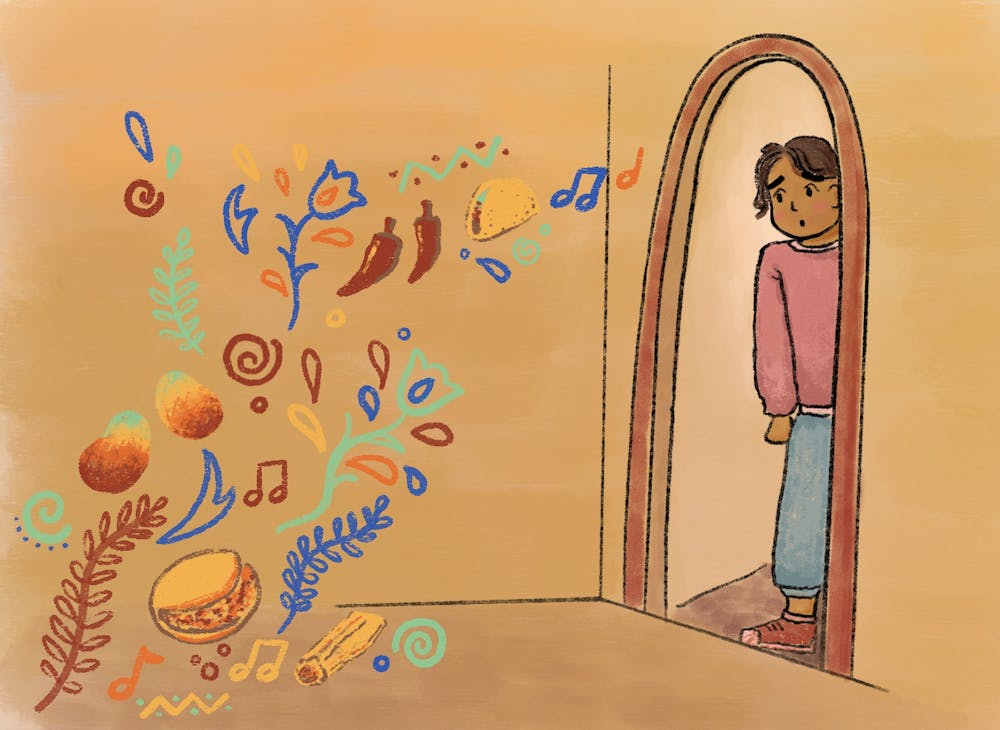I’ve been here before. It’s a hazy, remote memory in my mind, but it’s there. The lingering song of a raunchy salsa band wafting through the streets. The wandering stray dogs with matted fur. The white cross of the stone cathedral. Each direction births a new recollection, unwieldy and uncertain, yet unmistakably there.
The beckon of a marketeer turns my head. He’s expecting me—he is warm, welcoming. There are bananas, papayas, fruits I’ve never seen, and fruits I remember well. The sweet mangoes, bruised and browned from tumbling off the carts–their familiar, saccharine flavor colors my tastebuds. Almost involuntarily, I reach for one.
“How much?”
The vendor stiffens at my English, eyes becoming rigid with skepticism. “Cinco,” he counters. Behind him, a sign reads their price: dos bolivares. The trace of remembrance falters. I hand him a five and move on. The fruit’s dulcet taste isn’t enough to subdue the judgment of watching eyes around me. I’m a stranger to these townspeople, yet their voices are fleeting morsels of nostalgia to me.
The dirt roads empty as I walk along them, people repelled by an alien presence. Only oblivious schoolchildren approach me to ask to play, but they retreat at the first glimpse of my stuttering response. We may share a skin tone, a hair color, a facial structure, but nothing else. No amount of physical similarities can overcome this bubble of separation—I am alone.
A lost sense of reminiscence leads me down an endless path of houses with chipped, senescent paint and graffiti-covered walls. Hours pass. Or is it days? My feet carry me onward, only stopping at the mercy of a small, cement home. An ache of longing surfaces. The wooden door groans as it hangs off the latch, and I enter without asking. I recognize the briny scent of arepa dough that meanders through the house. The voice humming a melancholic canticle. The sound of feet quietly scuffling across stained, laminate floors, careful to avoid the cockroaches that nestle into the crook of the walls. This feels like it may have once been home.
In the garden, I see faces I know, their heads bobbing in harmony with the hymn and their grins spreading ear to ear. They’re faces I haven’t seen in years, almost decades. Their features are a blurred amalgamation of faded memories, withered with age. My grandmother is the only one to see me, her eyebrows furrowing in surprise. I expect a smile, an embrace, a welcome back. Yet she steps away, fear tainting her expression. There is no recognition. This isn’t a reunion.
“¿Quién eres?” “Who are you?” She’s still stepping away. The alarm rippling across her face intensifies.
Air catches in my lungs, releasing as a hollow absence of words. I’m frantic to tell her, to build a single sentence she’ll understand. “Abuela” doesn’t dare leave my mouth, much less “familia.” I’m racking my mind for the language I grew up on–grasping for anything to connect me to this foreign land, to connect me to my own family.
But only vacancy awaits, and my lips are left ajar as they persist in finding the words. My grandmother’s expression settles faintly, her eyes black with disappointment. Or maybe they’re black with indifference. She doesn’t know me. Has she ever? I am not her family; I haven’t been for years. I am a distant voice on a muffled, unreliable phone line. I am a three-word response to her pressing questions as I struggle to string together full sentences in my native language. I am an outsider. I am la gringa—the American.
I scour the dingy garden for a pen and paper, a phone to translate, any medium to indicate my regret, my guilt, my hope that we can fix this. There’s still time. I can restore the years lost to assimilation, lost to a society I will never feel welcome in. Desperation quickly builds to rekindle the bond I once felt to this place, these people, the culture, but it’s sluggish in comparison to the pace of time’s arrow as it ceaselessly moves forward. I’m climbing out of the Stygian void that had swallowed me before, with the weight of Western expectations calling my name as I slip out of its deceptive hold.
But the light is dimming, flickering, gone. My grandmother’s expectant face is dissipating into nothingness. The ground is shifting beneath me, laminate floors mutating to wood panels. The solemn gray of the walls grows into a muted brown. The flowers around me begin to die, losing their color as they wilt away. The warm aroma of arepas becomes the neat smell of an empty house. The familial hum turns into the buzz of a news anchor’s voice from a television below. Have I been here all along? In my hands appears a ratty photograph of a garden, alive with foliage and conversation. It’s a distant memory, one I have to will my mind to remember. But I do. I am home, perched in a rusted wooden chair with scars of use across it. Tomorrow’s homework is sprawled on my floor. I am home, yet the isolation strengthens. The house I’ve grown in feels just as far away as the lands I originated from.
My grandmother’s panicked, “Who are you?” echoes in my ears. In this new setting, I grasp at any vestige of my identity. Am I defined by the posters hung on my wall? The records in my drawer? The books cluttered on the floor? No, it’s none of these. The photograph of the garden trembles in my fingers. I’ve already lost the biggest part of who I am.
I pick up the phone and dial a number, quickly—frantically. It rings for what feels like years until the startling notification of my grandmother’s voicemail plays. “Déjame un mensaje y te llamaré más tarde,” she says. “Leave me a message, and I’ll call you later.”
I leave a message. It begins with Abuela.





